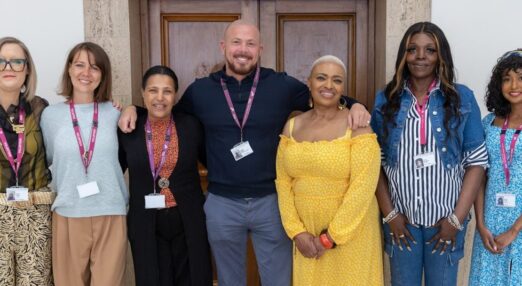Our new strategic plan reflects the significant growth in both capacity and confidence that Maudsley Charity has experienced since becoming an independent organisation in 2018.
We will commit more than £40m over the next five years, with a view to ensuring that even more people who experience mental illness can access the right care and support, now and in the future.
We will continue to fund projects that focus on solutions and prioritise those who are most failed, while working closely with the NHS and amplifying the impact of all the work we fund.
Our goals
The strategic plan comprises four strategic goals, plus one enabling and one sustainability goal, focused on what we can deliver against our mission in the next 5 years.
We want people who are affected by psychosis to have more choice and better outcomes when it comes to their treatment and care. That means improving access both within and outside of the healthcare system, to allow them to recover or live well with their illness.
Why this goal is important
- Psychosis and psychotic illnesses such as schizophrenia and bipolar disorder are one of the most life-altering health conditions. Impacts are likely to include challenges with employment, social and family relationships and physical health
- Southeast London has some of the highest rates of psychosis in Europe.
- There is a strong correlation between poverty, racism, trauma, and severe mental illness.
- Black men and women are disproportionately negatively impacted both in prevalence and in their experience of mental health services and treatment.
How we will get there
Through our programme ‘Living Well with Psychosis’ which will now extend to span the whole of this strategic plan period, we will:
- Increase our funding from our initial commitment of £10m to £14m to 2029 with a view to looking at impact over a 10-year period.
- Fund the trial or development of effective, culturally appropriate approaches and interventions in treatment and care at different scales.
- Build the capacity of trusted VCS organisations in Southeast London to work with people who have experienced psychotic illness to stay connected and be supported to stay well.
- Influence long-term, system-wide change – support high-potential projects to build evidence of what works and share that learning. This will include working with leaders at all levels, locally and nationally to understand and facilitate change at a system level.
We want children and young people aged 10-19 who are at the most at risk of developing and entering adulthood with mental illness to get the support they need, in the right way for them and early enough to make a lifelong impact.
Why this goal is important
- There is an increase in the complexity of children and young people’s lives, the health and
care system and a lack of time and resources for collaboration. - 50% of mental health difficulties are established by age 14 and 75% by age 24 – the views
and needs of the most at-risk children and young people are particularly poorly
understood or listened to. Trust and stigma are major issues for many of these children
and young people. - There is a need to reimagine how the most at-risk children and young people are
supported given the increase in demand for mental health services, current waiting list
times and thresholds for support.
How we will get there
Through establishing our currently named ‘Young People’s Programme’, we will:
- Commit c.£10m of funding to this programme over the period of this strategic plan.
- Test new ways to prevent the mental health needs of the most at-risk children and young people aged 10 to 19 from escalating.
- Focus on those children and young people who experience multiple complex difficulties (risk factors) such as poverty, a vulnerable family background, racism and/or discrimination, and co-occurring mental health difficulties and neurodiversity.
- Support collaborative, cross-sector approaches which involve children and young people at every stage and develop local and national partnerships.
- Capture learning and evidence from work funded which will inform how young people are supported in future locally and nationally.
South London and Maudsley Foundation Trust (SLaM) will be supported in its aim to provide outstanding care and support to all its communities. Our funding can help make improvements by enabling staff to deliver ideas for cross-organisational improvement and to provide scope for experimentation to improve care and to make enhancements that go beyond what the NHS may be able to provide.
Why this goal is important
- NHS mental health services are responding to greater and more complex mental health need with very limited resources.
- NHS staff want to innovate, instigate change in patient care, and support and learn from each other but often do not have the resource to support this.
- We are the largest mental health NHS charity and can support the kinds of projects that might not be possible in other trusts.
How we will get there
- Provide funds to SLaM staff to innovate and remove the obstacles to great care at all levels by continuing to provide the Change Makers small grants scheme. Alongside this, develop funding to support SLaM staff well-being and to improve patient care through access to activities, emergency support and improved hospital environments.
- Maintain the ORTUS building as a facility for collaboration and learning that supports NHS staff connection and development.
- Enhance opportunities for recovery through funding programmes outside of formal health care provision (e.g., recovery college, volunteering).
- Collaborate with SLaM leadership to develop new, long-term strategic projects which address cross-organisational ambitions or support a major transformational project.
- Secure vital additional funding from individuals and organisations who are committed to better mental healthcare to support SLaM-based initiatives.
The Kings Maudsley Partnership (KMP), with Pears Maudsley Centre for Young People as its home, will fulfil its promise to be a world-leading engine of innovation and research to improve the mental health of children in London, across the UK and globally. For the Charity this work signifies our long-term commitment to the mental health of young people, continued through our young people’s grant programme starting in 2024.
The doors of the Centre will open in late 2024, the product of more than six years of work across the partnership of South London and Maudsley Foundation Trust (SLaM), King’s College London (KCL) and Maudsley Charity. The building has been designed with input from young people and is intended to provide an environment which is welcoming and calming for children and families to improve recovery. For the first time NHS and research teams focused on transforming how we understand, treat, and importantly, prevent mental illness in children will be sharing spaces designed for collaboration. They will have access to state-of-the-art equipment which will provide opportunities to push the boundaries of our understanding of causes and effective treatment.
Why this goal is important
The number of children and young people experiencing mental health problems has never been higher and is increasing.
The inequity in prevalence, experience and outcomes for children and young people which exist are unacceptable and must be addressed.
Demand is such that the period of time between research about what might work in prevention and treatment and the adoption of that evidence into practice is far too long.
How we will get there
Work with our partners in SLaM and KCL, and the new director of the KMP, to keep the partnership true to our shared vision and aspiration. We will support colleagues across the partnership to develop short-, medium- and long-term strategies for delivering ambitions and to be a critical friend, helping to hold our colleagues to account against these plans.
We will develop and start to deliver a fundraising strategy with our fundraising partners KCL for the first five years with ambitious targets for income to support research and clinical innovation; investing in the relationships we hold with fellow funders to the Centre to ensure ongoing support and positive, productive relationships.
We will keep our specific focus on those most failed as central to our engagement with the partnership. The partnership has a unique opportunity given the population of southeast London and the expertise based in the Centre to make a real impact on inequity in access to and outcomes from care.
Enabling goal
Authenticity is important to us. DEI is fundamental to our mission, and we are as committed to providing an environment that supports equity and good mental health as an employer, as we are as a grant funder.
Why this goal is important
- The Charity has grown quickly and is still developing – we need to be intentional about developing our culture to attract and retain staff, and build effective team working.
- Our commitment to DEI is a visible focus of our change model and communication. It is essential if we want to deliver on this and have credibility in this space, we maintain momentum and keep it as a central focus.
- We cannot be the best organisation we can be if we do not understand and reflect the communities we serve, and we cannot find the solutions to the big issues in mental health, if diversity, equity, and inclusion has not been considered at every stage of our thought process and work.
- We need to be intentional in ensuring we are learning continuously from what has gone well and what hasn’t and drawing insight from outside the Charity to inform our work.
What we will do
We want to be a progressive, efficient, and impactful funder. In the next few years, this will mean an increased focus on evaluation and learning and on developing systems and processes that support applicants, grantees, and our people to spend time on developing projects and not create unnecessary burden.
We want to increase the value we can gain in the design of our work and how we make decisions about funding by drawing on all types of expertise in mental health – from lived experience and that of carers to clinical and academic knowledge.
We have already made a visible commitment to DEI in our choices of work and in our employment practices, and over the next five years, we will deepen this commitment. We will develop further our inclusive grant-giving approach and build trust and partnership with organisations that can speak for and with the communities most impacted by mental illness.
Our people are central to our success. We have grown rapidly in 5 years and the next period will require a continued focus on the development of our culture and our view of what it means to be a high-performing team, ensuring we attract those who have the skills to help us continue to mature as an organisation, ensuring they feel valued and supported in their roles.
Sustainability goal
As society and the NHS continue to evolve, so will the demand for funding for mental health care.
We have a responsibility then to steward our funds effectively for the future, to extend our impact by working with others to increase funds available, and to amplify the impact of the work we fund.
Why this goal is important
We need to strike a balance between delivering impact now and ensuring we can support people who experience mental illness in decades to come. We are setting this plan in a period of major pressure on and fluctuation in national economies, increasing international conflict and growing urgency for climate action. We will need to make decisions about our investments and ambitions for the medium- and longer-term grant giving in this context.
This plan contains commitment to two major activities new to the Charity – fundraising beyond our partnership with KCL and influencing and amplification of learning from our work. To be successful in either of these areas requires setting the foundations for that change that will continue well into the next strategic period.
What we will do
The last strategic plan period saw us move from a more passive to active management of our endowment, taking informed, strategic decisions about the portfolio as a whole. In this plan period we plan to continue to increase the value of the endowment and in parallel ensure that we are managing our assets within a clear appropriate ethical framework and with a plan for carbon emission reduction.
This strategic plan period will mark a move from aspiration to action in a number of areas which have a focus on long-term impact.
- Maintain the real value of the endowment and be mindful of how our investments can have broader impacts on society and the environment.
- Deliver the first phase of our fundraising strategy including the next phase of work to generate funds for the Kings Maudsley Partnership and initiatives beyond this developed with SLaM.
- Build our credibility, visibility, and relationships to lay the foundations to extend the impact of the work we fund. We will commit time and energy to increasing recognition and engagement in the wider Mental Health sector to achieve our ambitions for national impact.
Read more on how we will achieve our Strategy
-

Diversity, Equality and Inclusion
As an organisation we are working to achieve positive change together with those who share our values and commitment.

